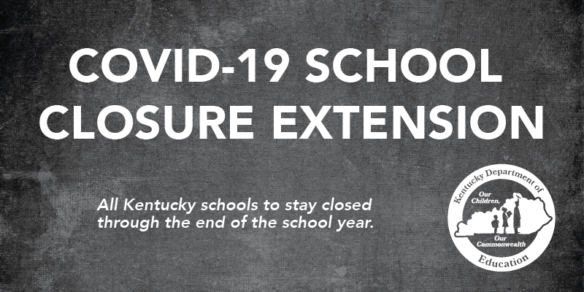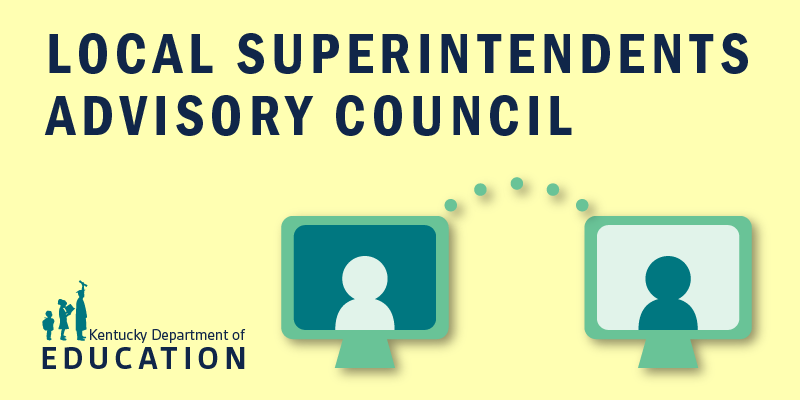
- The Education Continuation Plan allows districts to continue to use the Non-Traditional Instruction Program for the remainder of the school year and grants relief for districts as they attempt to reach the required 1,062 hours of instructional time.
- Districts may count all NTI days used during the 2019-2020 school year – including NTI days used before the current closure period – as seven-hour equivalent days.
By Mike Marsee
mike.marsee@education.ky.gov
(FRANKFORT, KY) – Gov. Andy Beshear recommended April 20 that the suspension of in-person classes in Kentucky schools continue for the remainder of the 2019-2020 school year to help mitigate the spread of COVID-19 in communities across the state.
In a teleconference call, Beshear told Kentucky’s public school superintendents that the school closure period that began March 16 should continue even after Kentucky reaches phase one of the federally recommended guidelines for reopening the state.
“Because of that, I’m not going to be able to recommend that we resume in-person classes this year,” Beshear said. “It’s just not going to be safe for our kids, it’s not going be safe for our families and it could frustrate all the gains we have made to this point.”
In conjunction with the governor’s announcement, the Kentucky Department of Education (KDE) released a plan designed to maximize instruction during the COVID-19 pandemic.
The plan allows districts to continue to use the Non-Traditional Instruction (NTI) Program for the remainder of the school year and grants relief for districts as they attempt to reach the equivalent of 1,062 hours of instructional time.
“Our schools have been closed to in-person classes, but our schools have not been closed. This does provide you some certainty, though,” Interim Education Commissioner Kevin C. Brown said. “Here is something that we’re going to be able to do at the state level that I think will assist everyone.”
Education Continuation Plan
The COVID-19 Education Continuation Plan will allow districts to end the school year two weeks earlier than envisioned by Senate Bill 177, which will result in all districts ending instruction by May 29, with most districts likely to finish in mid-May. Senate Bill 177 waived student attendance requirements and provided options for districts to reach 1,062 hours by June 12.
“We want to get school finished before June 12,” Brown said.
Because NTI relies not upon seat time but upon project- and competency-based learning, districts may count all NTI days used during the 2019-2020 school year – including NTI days used before the current closure period – as seven-hour equivalent days.
Without a plan, districts have been unclear as to expectations and are on various schedules to reach the minimum 1,062 hours of instruction required by state law. Some districts are scheduled to reach 1,062 hours soon as April 24, while others would not reach that number until June 3 or later.
Exceptions are available for schools and districts that encounter extraordinary circumstances or logistical hardships, or in the event the governor determines a district can no longer use NTI for public health reasons. In those cases, the district can request assistance from the interim commissioner to determine a plan for maximizing instructional time, or the governor can waive the 1,062-hour requirement.
All 172 Kentucky school districts, 53 area technology centers, Kentucky School for the Blind and Kentucky School for the Deaf ceased in-person classes and began instituting NTI in response to a previous recommendation made by Beshear on March 13.
“While NTI fatigue is being reported across the state from students, teachers and parents, our students require continued instruction using the only operable education delivery platform available to us at this time, which is NTI,” Brown said. “Students, teachers and parents are also reporting learning success using NTI via social media. Districts maintain flexibility to amend calendars to add closure days to address the fatigue of teachers, students and parents.
“It appears that our teaching force is healthy … and NTI is better today than it was on March 16 in our districts, and it’s going to be better on May 1 than it is today.”
Beshear told the superintendents NTI is vital for reasons that go beyond continuing instruction.
“Our kids are suffering from a lot of anxiety right now, and I believe the structure that you are providing is not only giving them intellectual enrichment, I believe it helps on the emotional end,” he said.
Under the Education Continuation Plan, KDE also plans to:
- Team with education partner groups to continue to provide guidance to districts to educate, feed and support.
- Hold additional webcasts specifically aimed at districts new to NTI to provide additional guidance and support.
- Team with education partner groups to begin providing guidance to districts for how resources can be deployed over the summer to assist students with feeding, academic support and remediation.
- Participate in the Southern Regional Education Board’s K-12 Education Recovery Task Force to inform KDE, its Education Continuation Task Force and education partner groups on current research and practice in reopening schools for the 2020-2021 school year.
- Team with education partner groups to begin providing assistance to districts for planning the 2020-2021 school year, including guidance to districts and schools on how to blend the diagnosis of missing content knowledge and moving forward with current year learning and up-to-date information about how federal and state guidelines may affect the upcoming school year.
Proms and graduations
Brown said he knows many people will be saddened by the news that school buildings will not reopen and traditional end-of-year activities will not take place as scheduled.
“I think we all anticipated that this day might come. I know this will be met with a lot of disappointment, particularly with our seniors and others who are looking forward to resuming in-person classes, but we know that’s just not possible,” he said.
Beshear said holding events such as proms and graduations in their traditional formats would not be possible even if Kentucky reaches the seven benchmarks he discussed April 17 for reaching the first phase of reopening the state spelled out in federal guidelines, because gatherings would be restricted to groups of no more than 10 people during phase one.
“When we look at our benchmarks … we’re not going to be able to have an in-person prom or graduation in a building, or even an outdoor graduation,” he said.
He recommended two options for graduation ceremonies: a virtual ceremony, which he said is the safest option, and a drive-in ceremony similar to the services being held by many churches.
“If we got people together outside of that for a graduation right now, this virus would spread,” Beshear said. “While it’s a special moment, we want to make sure it’s done in a way that is truly safe and doesn’t put people in harm’s way.”
Many schools have expressed a desire to have an in-person graduation at a later date, but the governor said there is no way to know when that might be possible.
Looking ahead to summer and fall
Brown said KDE and districts should begin examining the outreach services schools and districts provide during the summer to consider how those services might be delivered during a time when in-person gatherings might still be restricted.
“Most services this summer have to be offered in a non-traditional way,” he said.
Beshear said it is too early to tell whether the closure period might be extended into the start of the 2020-2021 school year.
“I’m committed to do all I can to help this state meet the benchmarks to have as normal a school experience in the fall as possible,” he said.
MORE INFO …
- Kentucky Department for Public Health’s COVID-19 webpage
- KDE’s COVID-19 webpage
- COVID-19 Hotline (800) 722-5725




Leave A Comment